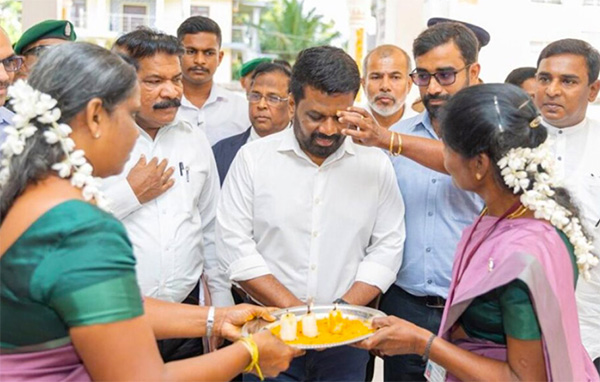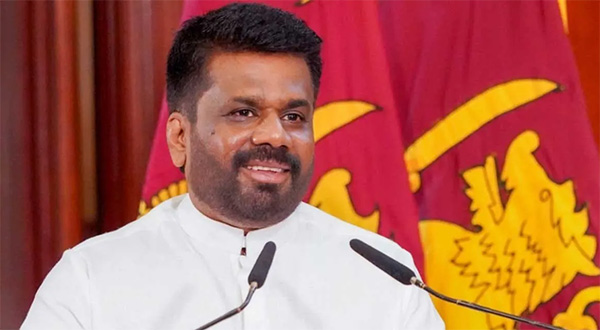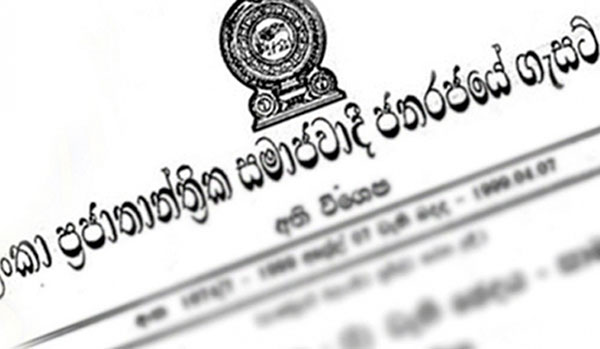President Anura Kumara Dissanayake is showing the change for the better that a single individual can bring by challenging old ways of doing things by those who have traditionally governed the country. According to the news media and first person accounts by reliable commentators contacted in Jaffna, the president’s visit to the Jaffna peninsula last week was a resounding success that is good for the unity of the country. It seems that the president timed his visit to the north in the context of forthcoming local government elections that are anticipated to be held in April.
The focus on Jaffna during his visit would have been the central place that Jaffna has as the civilisational seat of the Tamil people. The president used the time he had allocated to Jaffna to pay his last respects to former parliamentarian and leader of ITAK (Federal Party) who had, for decades, been at the forefront of the Tamil struggle for regional self-government, devolution of power and equal rights. He also had the confidence to go to Valvettithurai which was the birthplace of the late LTTE leader Velupillai Prabakaran and conduct a public meeting there.
The president’s visit took place without the usual high security in which large numbers of soldiers would be placed at strategic locations not only in the areas that the president would be visiting but also on the approach roads to Jaffna. Residents observed that the security presence appeared to be low in comparison to the past, when roads would be closed and security personnel stationed on a 24-hour basis on the roads in residential areas. The reduced level of security demonstrated the president’s trust in the goodwill of the people. During his visit he mingled at close quarters with the people, being embraced and having his photographs taken with them.
EVERYDAY FOCUS
Addressing the people, President Dissanayake promised to bring development to Jaffna. In the year prior to the onset of fierce fighting in Jaffna that destroyed its housing and factories, Jaffna had a handful of industries, chief amongst them being the salterns in Paranthan and the cement factory at Kankesanthurai. The president pledged to rebuild these industries and to establish three new industrial zones in Paranthan, Mankulam, and Kankesanthurai to boost employment and economic growth. Sri Lankans who emigrated due to the war were invited to invest in these projects.
The president also used the occasion of his visit to present an analysis of the reasons for the ethnic conflict the country had experienced. He said that previous generations of politicians had used ethnic nationalism as a means to win elections and this had resulted in the division of people into different communities that did not trust each other. However, the last general election that had brought the NPP to power had seen the people reject the traditional political leaders who came from elite families. Instead, they had voted for the NPP regardless of ethnicity, religion or region. The president pointed out that this was a new development.
The general election in December last year saw the NPP win the majority of parliamentary seats in the north and east which have traditionally voted for Tamil political parties which take up an ethnic Tamil nationalist line. The main issues they have canvassed have been Tamil equality and self-rule in the north and east. However, those parties have never been able to deliver on the mandates they received at elections. Some of the Tamil parties reached agreements with the ruling parties of those days, but were invariably let down. The president’s focus on the everyday problems of the people would be important in inducing them to vote for the NPP at the forthcoming local government elections.
UNHRC RESOLUTION
It is worth noting that President Dissanayake made a positive impact on the people of Jaffna even though he did not address the issues of Tamil nationalism and self-rule that have preoccupied them in the past. The fact that the forthcoming elections are local level ones also reduces the significance of national issues. Local government elections the world over are about local level issues rather than national ones. In his public speeches the president spoke about providing jobs to unemployed university graduates from the 30,000 vacancies in state institutions. He stated that Tamil speaking police officers would be recruited. He also referred to improving the water supply schemes to the people of the north, making the observation that they had the lowest consumption of piped drinking water in the country
The president would be aware that whatever concession he makes to Tamil nationalism will be seized upon by his political opponents in the south of the country to fan Sinhalese nationalism. There are indications that the former ruling parties that got defeated at the last presidential and general elections are seeking to make a comeback by coalescing with one another. Their concern about the present political developments would have been increased by the president’s statements in Jaffna that the government would not permit the self-seeking traditional political elites to divide the people anymore and that they will be held accountable before the law for corruption they have engaged in.
The president’s analysis in Jaffna that ethnic nationalism was used by rival political parties to obtain electoral support to prevail at elections is an accurate one. However, the underlying issues that the ethnic nationalist politicians utilised to come to power need to be dealt with in a way that is mutually accepted by all communities. Sri Lanka is still in a post-war situation where there is no more war. But the causes and consequences of the war still remain unresolved in the form of missing persons, long term prisoners, land that is under military occupation and the continuing high military presence in the north and east of the country.
Sri Lanka now needs to become a post-conflict society. This requires that the issues of the war that continue to unresolved be dealt with without further delay. This is what the UNHRC resolutions in Geneva that come up time and time again are about. There have been 16 IMF agreements in the past but not a single government could implement them to the end. It appears that the present government is determined to go the course to get Sri Lanka onto a sound economic footing. In the case of the ethnic conflict there have been many political solutions proposed to politically resolve the ethnic conflict. But no government has had the strength or conviction to take them forward and ensure sustainable national unity. Perhaps government led by President Dissanayake will.
by Jehan Perera







